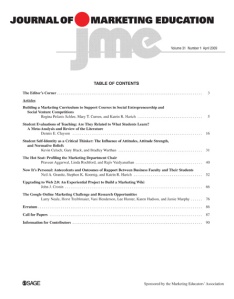Technology Extends Learning and Engagement Outside of the Classroom
[We’re pleased to welcome Gavin Northey of University of Western Sydney. Professor Northey published an article entitled “Increasing Student Engagement Using Asynchronous Learning” with Tania Bucic, Mathew Chylinski, and Rahul Govind in the Journal of Marketing Education.]
- What inspired you to be interested in this topic?
There is a broad body of research that links student engagement to learning outcomes. Often, though, studies fail to provide usable frameworks that assist with the creation and maintenance of engagement in a learning setting. Recent research in marketing, such as work on service dominant logic (Vargo and Lusch, 2004), has suggested that truly engaged participants come about by being involved in production. In a learning environment, this means that education consumers (the students) should be included in the knowledge production process. Based on this, we looked to extend this concept so that students could involve themselves in the creation of knowledge through both synchronous and asynchronous channels. We also wanted to test whether the use of extrinsic, in-class rewards could be used to motivate participation in out-of-class activities.
- Were there findings that were surprising to you?
To some extent, the findings appear to be reasonably intuitive, in that students who participate in topic-related discussions both in class and outside of class achieve higher academic outcomes than students who only participate in-class. An interesting finding within the data was that the actual level of activity in the out-of-class asynchronous network was not the main driver of improvement in academic outcomes. Rather, membership of the out-of-class group was critical. It would appear that a substantial number of students would login to the out-of-class, online discussions and use the time to observe and reflect. While this wasn’t hypothesized or specifically tested, from the data it did appear the chance for observation and reflection increased topic knowledge, which the students then brought back into class.
- How do you see this study influencing future research and/or practice?
Around the world, education is currently undergoing a major transformation. Student cohorts are increasingly multicultural, requiring educators to accommodate very diverse learning styles. Along with this, digital technology is so prevalent in modern lifestyles that education consumers (students) are demanding a rethink of product and service delivery. A potential benefit of this is that the combination of synchronous and asynchronous learning opportunities enables students to self-select into the option that is most appropriate for their learning needs. By tailoring course delivery to their own requirements, the flow on is increased commitment and engagement and a deeper learning.
The abstract:
Student engagement is an ongoing concern for educators because of its positive association with deep learning and educational outcomes. This article tests the use of a social networking site (Facebook) as a tool to facilitate asynchronous learning opportunities that complement face-to-face interactions and thereby enable a stronger learning ecosystem. This student-centered learning approach offers a way to increase student engagement and can have a positive impact on academic outcomes. Using data from a longitudinal quasi-experiment, the authors show that students who participated in both face-to-face on-campus classes and asynchronous online learning opportunities were more engaged than students who only attended face-to-face classes. In addition, the findings show that participation in the asynchronous setting relates significantly and positively to students’ academic outcomes (final grades). The findings have notable implications for marketing education.
You can read “Increasing Student Engagement Using Asynchronous Learning” from Journal of Marketing Education by clicking here. Did you know that you can have all the latest research from Journal of Marketing Education sent directly to your inbox? Just click here to sign up for e-alerts!
 Gavin Northey is a PhD candidate at Western Sydney University and manager of the UNSW Australia Business School Experimental Research Laboratory. His marketing research focuses on sensory marketing and cross-modal effects between sensory modalities. His teaching philosophy reflects a student-centered learning approach, with a preference for outcomes based education, constructive alignment and sustainable assessment. As a result, his education research concerns the use of online tools and asynchronous leaning and their affect on student engagement.
Gavin Northey is a PhD candidate at Western Sydney University and manager of the UNSW Australia Business School Experimental Research Laboratory. His marketing research focuses on sensory marketing and cross-modal effects between sensory modalities. His teaching philosophy reflects a student-centered learning approach, with a preference for outcomes based education, constructive alignment and sustainable assessment. As a result, his education research concerns the use of online tools and asynchronous leaning and their affect on student engagement.

Tania Bucic (PHD) is currently Senior Lecturer and School of Marketing L&T Coordinator at the University of New South Wales (UNSW). Tania is passionate about quality teaching practice and lifting the profile of L&T. She has distinguished herself by winning a string of teaching-related accolades at faculty, university, and national levels including: Bill Birkett Teaching Award; Vice Chancellor’s Awards for Teaching Excellence; ANZMAC -Pearson Marketing Educator Award; and most recently, a 2013 Citation for Outstanding Contributions to Student Learning. In addition, Tania has published in: Journal of Business Ethics, International Journal of Innovation Management, Journal of Workplace Learning, as well as conference such as ANZMAC (10 papers), PDMA and Frontiers in Service. She is an ad-hoc reviewer of several journals and conferences and has acted as chair for several ANZMAC conferences.
 Mathew Chylinksi is currently a Senior Lecturer at the University of New South Wales (UNSW). He has previously been published in International Journal of Biomedical Engineering and Technology, Marketing Science, and European Journal of Marketing.
Mathew Chylinksi is currently a Senior Lecturer at the University of New South Wales (UNSW). He has previously been published in International Journal of Biomedical Engineering and Technology, Marketing Science, and European Journal of Marketing.

Rahul Govind is currently a Senior Lecturer at the University of New South Wales (UNSW). Dr. Govind’s research utilizes spatial dependence in empirical data to study two types of marketing problems. His first research stream focuses on studying the geographical similarity between consumers in devising solutions for services marketing. In addition to utilizing existing spatial modeling methods, his research has aimed to create tools for spatial marketing. His second research stream utilizes geographical similarity between consumers to analyze health problems focused on consumption. The aim of this stream is to devise spatially variant health marketing strategies for public policy officials to combat the problems that can arise out of negative consumption. He has previously been published in Health Marketing Quarterly, International Journal of Research in Marketing, Gerontologist, and Journal of Marketing.

























































































